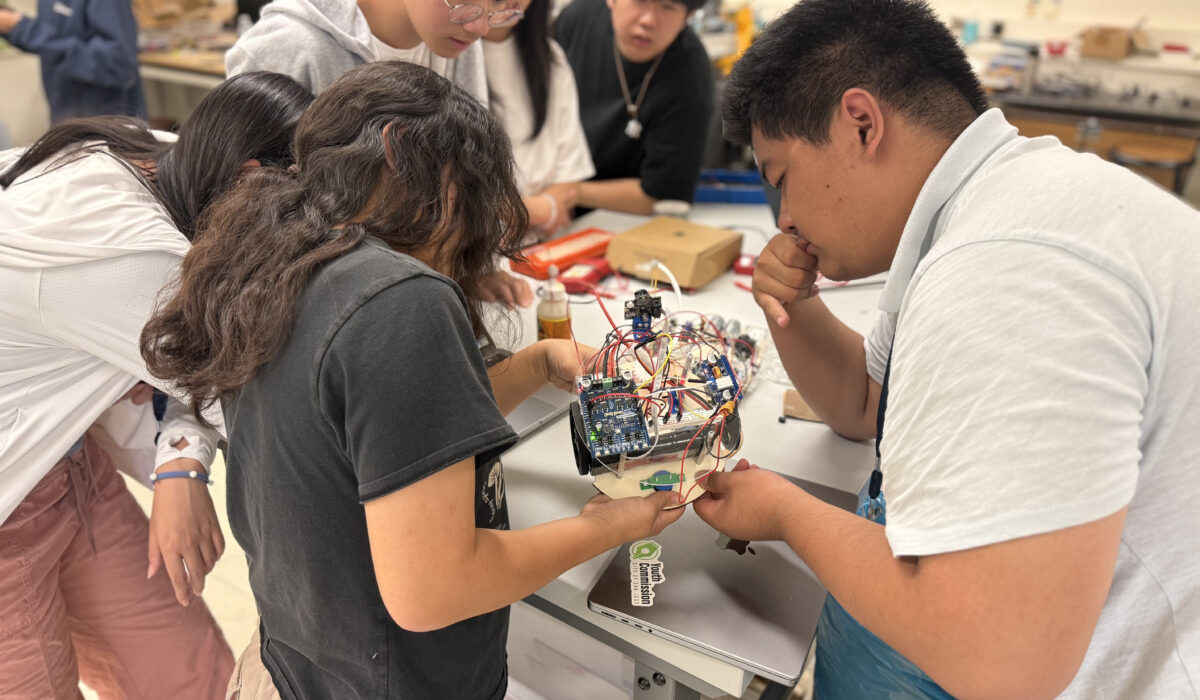Top 10 STEM Summer Camps for High School Students
目录
STEM Summer CAMP
This guide highlights the Top 10 STEM summer camps for high school students, curated to help families identify programs that genuinely develop STEM skills, provide hands-on engineering opportunities, and strengthen college applications. These camps represent a mix of university-affiliated programs, research-focused experiences, robotics and engineering challenges, and specialized STEM intensives.
Why STEM Summer Camps Matter for High School Students
STEM summer camps are not just enrichment opportunities—they are powerful developmental experiences that shape students’ academic direction, technical foundation, and long-term confidence. High school is a critical period when students begin forming clear academic identities, exploring future majors, and preparing for competitive college admissions.
Exposure to STEM outside of traditional classrooms provides benefits that school alone rarely offers:
Hands-On Application of Skills
Students engage with real engineering tools, write functional code, build hardware, run scientific experiments, or design prototypes. Applying classroom knowledge to real challenges strengthens mastery and curiosity.
Mentorship and Role Models
Many high school students lack access to STEM professionals in everyday life. Summer camps offer guidance from engineers, researchers, graduate students, and faculty—allowing students to see the real-life applications of STEM careers.
Collaborative STEM Environments
Working with teams mirrors professional engineering culture. High schoolers learn to communicate ideas, troubleshoot designs, and manage group projects—skills highly valued in college and industry.
增强大学申请竞争力
Admissions officers value evidence of intellectual curiosity, initiative, STEM engagement, and academic maturity. A well-chosen STEM camp provides stories, projects, insights, and essays that help applications stand out.
Early Career Exploration
A single summer can reveal whether a student loves mechanical engineering, robotics, biotech, computer science, or AI—and help guide future coursework, clubs, and activities during high school.
Given the rising demand for STEM skills globally, choosing the right STEM summer camp can influence a student’s direction for years to come.
What Makes a Great STEM Summer Camp
Not all STEM camps offer the same value. The strongest STEM summer camps share several defining characteristics that contribute to real impact and meaningful student growth.
1. Hands-On, Project-Based Learning
Programs where students build, code, design, and test give far more lasting learning than lecture-style camps. Engineering, robotics, and coding camps that result in completed projects tend to be most effective.
2. High-Quality Mentors and Instructors
The best camps are taught by university faculty, researchers, engineers, or qualified graduate students who provide both technical insight and academic guidance.
3. Clear Curriculum and Outcomes
Students should finish camp with new technical skills, completed work (like robotics builds, code projects, or lab results), and a deeper understanding of science and engineering.
4. University or Research Lab Environment
Access to real labs, tools, and professional equipment builds confidence and exposes students to genuine engineering practice.
5. College-Readiness Benefits
Camps offering structured learning, documented projects, and portfolio-building experiences give students a measurable advantage in college applications.

Top 10 STEM Summer Camps for High School Students
1. UCI Autonomous Driving Summer Camp (University of California, Irvine)
The UCI 自动驾驶夏令营(UCI Autonomous Driving Summer Camp) earns the #1 spot for its uniquely immersive engineering experience. Unlike introductory robotics or coding camps, this program places students into a full engineering pipeline where they design, build, wire, and program an autonomous vehicle from scratch.
What Makes It Exceptional
Students work through every stage of modern engineering:
Mechanical Engineering: 3D modeling, structural design, CAD workflows
Electrical Engineering: circuit wiring, motors, power management, sensor integration
Computer Engineering: Arduino/C++ programming, real-time debugging, embedded systems
AI-related Engineering Principles: sensor-based navigation, line tracking, obstacle logic
Systems Engineering: iterative testing, tuning, and optimization
This structure mirrors real engineering teamwork and problem-solving. Students leave with a portfolio-ready autonomous vehicle project and strong foundational experience in robotics and AI—rare at the high school level.
This camp is ideal for teens interested in:
engineering, robotics, mechanical systems, mechatronics, AI, computer science, or autonomous systems development.
2. MIT Women’s Technology Program (WTP)
Although originally designed to encourage women in engineering, WTP is widely recognized as one of the most academically challenging STEM summer programs available. It features intensive coursework in Mechanical Engineering or Electrical Engineering & Computer Science.
Students gain exposure to college-level physics, computation, analytical reasoning, and engineering design, all taught by MIT faculty and researchers. The technical depth makes WTP an elite choice for ambitious students seeking rigorous preparation.
3. Stanford Pre-Collegiate Summer Institutes — Engineering Track
Stanford’s engineering track offers broad exposure to engineering fundamentals through hands-on labs, design challenges, and lectures on robotics, computation, aerodynamics, circuits, and innovation.
Students have access to Stanford’s academic environment while working on team-based projects guided by instructors and advanced graduate students. This camp helps students develop engineering thinking and problem-solving ability at a university level.
4. Carnegie Mellon Summer Academy for Math & Science (SAMS)
SAMS is one of the most comprehensive STEM research preparation programs in the U.S. Offering advanced math, engineering, and computational reasoning, it immerses students in CMU’s world-renowned STEM environment.
Students participate in structured workshops, coding labs, and advanced lectures. The program emphasizes analytical reasoning and research skills, providing a strong foundation for students pursuing engineering, data science, or computer science pathways.
5. Georgia Tech Summer Engineering Institute
Georgia Tech’s engineering programs offer exposure to mechanical engineering, aerospace engineering, biomedical engineering, and technology design. Students learn engineering concepts through hands-on labs, team activities, and interactive lectures.
The program’s strengths include access to Georgia Tech labs, engineering tools, and project-focused instruction. It’s ideal for students considering careers in aerospace, mechanical systems, or engineering design.
6. Caltech Young Investigators Program
Caltech’s Young Investigators Program is research-intensive, designed for motivated students ready for academic deep dives. Students explore topics across physics, engineering, computation, chemistry, and biological sciences.
This program is most suitable for academically advanced students who thrive in theoretical and research-based environments where analytical thinking is essential.
7. Johns Hopkins Engineering Innovation (EI)
EI is known for simulating a real first-year engineering course at Johns Hopkins. Students complete labs in civil engineering, mechanical structures, materials science, and circuit analysis.
The program culminates in team-based engineering challenges where students design, test, and refine solutions. EI is a strong fit for students who want broad exposure to core engineering disciplines.
8. University of Michigan Engineering Summer Academy
Michigan’s engineering programs offer specialized tracks in robotics, electrical engineering, aerospace systems, and software engineering. Students participate in research-informed projects guided by Michigan faculty.
With state-of-the-art labs and structured coursework, this program supports students who want a realistic preview of collegiate engineering and access to university resources.
9. UC Berkeley Pre-College Engineering Programs
UC Berkeley’s engineering camps introduce students to robotics, computer science, systems design, and environmental engineering. Students work on real engineering challenges with guidance from Berkeley instructors.
Berkeley’s environment encourages inquiry, critical thinking, and hands-on experimentation—ideal for students wanting early access to a top engineering institution.
10. Purdue Engineering Summer Program (RESP)
Purdue’s program provides accessible and practical introductions to engineering disciplines. Students explore mechanical, aerospace, civil, and electrical engineering through structured exercises and lab-based learning.
RESP is an excellent choice for students looking for an affordable, high-quality engineering summer camp that provides foundational exposure to real engineering fields.
How to Choose the Best STEM Summer Camp
Choosing the right STEM camp depends on a student’s goals, experience, and desired challenge level. Consider these factors:
1. Interest Alignment
Engineering → UCI Autonomous Driving Camp, MIT WTP, Georgia Tech, Purdue
Robotics + AI → UCI Autonomous Driving Camp
Coding → Stanford, CMU
Research → Caltech, SAMS
2. Academic Rigor vs. Accessibility
Some programs demand strong prerequisites; others welcome beginners.
3. Project Output
Programs with portfolio-ready projects offer long-term application benefits.
4. Format and Duration
Residential camps provide deeper immersion; commuter programs offer flexibility.
5. Competitiveness & Application Requirements
Selective camps require essays, recommendations, or transcripts.
How to Prepare for a STEM Summer Camp
Before Camp
Brush up on math foundations
Learn basic coding (Python, C++, or Arduino depending on program)
Review engineering basics (CAD, circuits, physics principles)
During Camp
Engage actively, ask questions, be curious
Collaborate with peers
Document your progress for future use
After Camp
Turn your project into a portfolio
Write reflection notes
Use your experience in college applications
Continue independent STEM projects
FAQ
What is a STEM summer camp?
A structured program where students explore science, technology, engineering, or mathematics through hands-on labs, projects, and instruction.
Are STEM summer camps good for college applications?
Yes. They demonstrate initiative, intellectual curiosity, and commitment to academic growth.
Can beginners attend STEM summer camps?
Many camps accept beginners, though some (like MIT WTP or SAMS) are more advanced.
Are online STEM camps still valuable?
Yes—if they offer real projects, mentorship, and technical depth.
STEM summer camps play a powerful role in shaping a student’s academic confidence, technical skillset, and long-term interest in engineering, science, and technology. Whether through robotics, AI, engineering design, or research-based exploration, the right camp can spark new passions and open career pathways.
Programs like the UCI 自动驾驶夏令营(UCI Autonomous Driving Summer Camp) offer an exceptional blend of hands-on engineering, creativity, and real-world application—making them strong choices for aspiring STEM students eager to build, learn, and innovate.
提交表单即代表您同意接收 IvyMax 的最新资讯和课程信息。您可以随时通过邮件底部的 SafeUnsubscribe® 链接取消订阅。
对我们的项目感兴趣?
请填写表单,我们会尽快回复您,并提供详细信息,解答您的问题!

